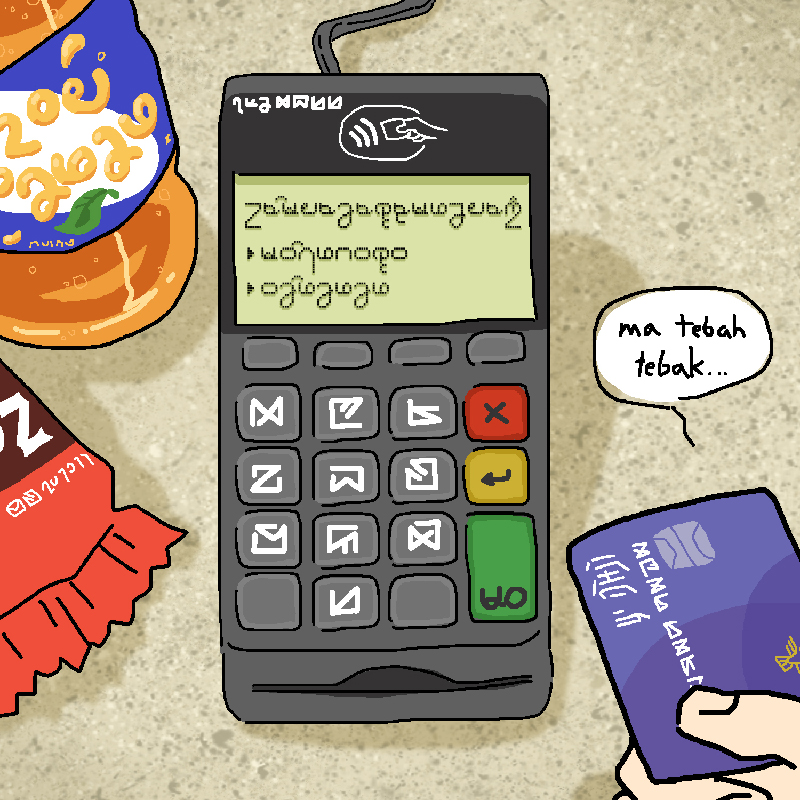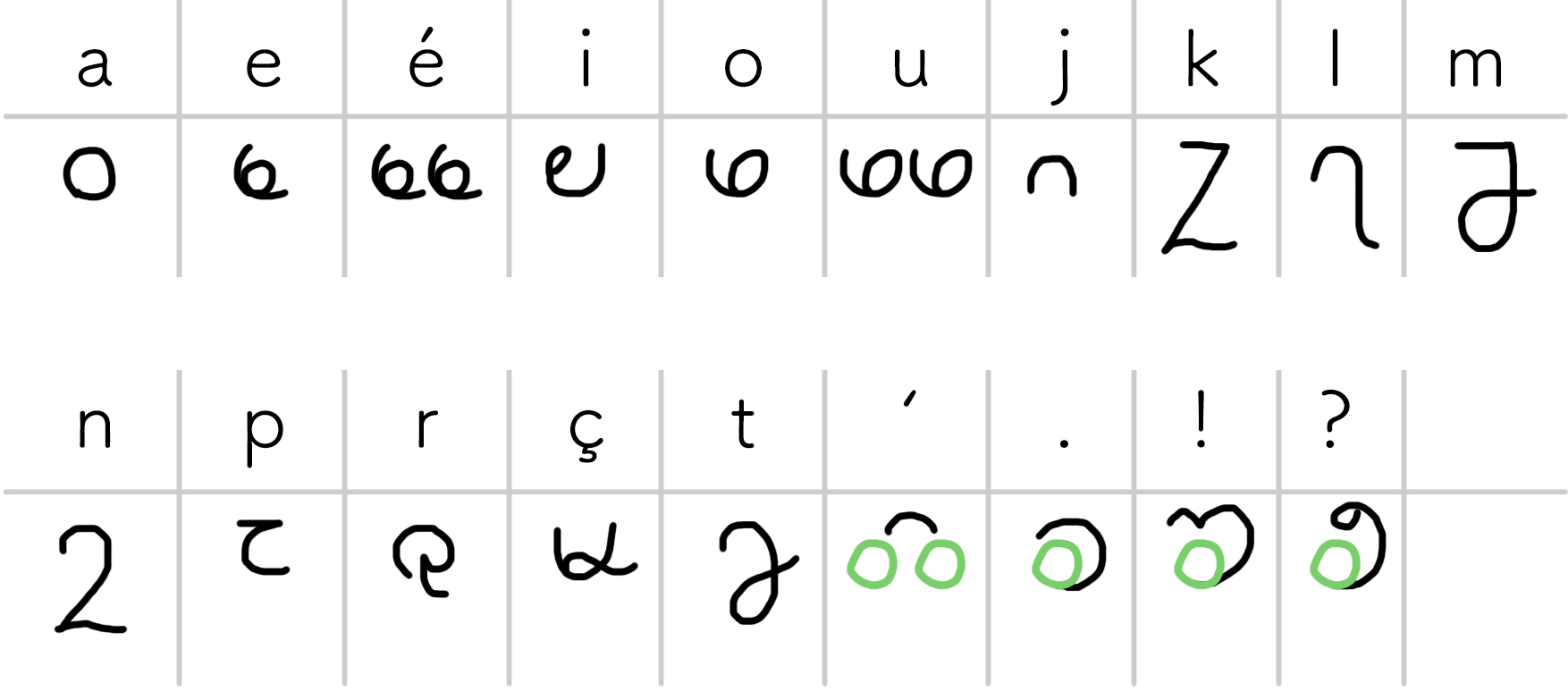Lioç

| DATE | 2024 |
| RELATED |
the world of Ajulioç & Bachanot Bihni |
Lioç is the offiial language of Ajulioç, the neighbouring country to Bachanot and the dominant regional culture. From an outside perspective, the Lioç language is casual and rambly, seemingly concerned with reciprocation and friendly conversation above efficiency.
Pronouns
| SUBJECT |
OBJECT/ REFLEXIVE |
POSSESSIVE* | |
| 1st person (single) | -enn | tenn | ienn(arra) |
| 2nd person | -é | té | ién(arra) |
| 3rd person (single, male) | -érra | térra | ié(rarra) |
| 3rd person (single, female) | -éça | téça | iéç(arra) |
| 3rd person (single, neutral) | -éta | téta | iét(arra) |
| 1st person (plural) | -ennéç | tennéç | ienn(éça) |
| 3rd person (plural) | -et'tat | tet'tat | iét(ata) |
Verbs
Lioç verbs not only conjugate by tense, but also according to time relative to the time the conversation takes place. There are four segments to a Lioç verb:
- janéçoniennéç
- [jan] [éço] [ni] [ennéç]
- verb - tense - time - pronoun
- "We are (and the time is late morning)", transliteration: "be.present.late-morning.we"
The time marker is flexible; many Lioç speakers do not worry themselves with being accurate and these markers are more often used as general indicators rather than adding specific information to a sentence, especially when talking in past and future tense.
| TENSE | AFFIX | TIME MARKER | AFFIX |
| present | -éço- | early morning | -mi- |
| future | -et'to- | late morning | -ni- |
| past | -eti- | afternoon | -ti- |
| hypothetical** | -na- | night/evening | -çi- |
** The hypothetical tense always uses the current time marker, regardless of context. For example, if someone is talking about something they would have been doing that morning but it is currently evening, they would say jannaçienn rather than jannanienn.
The early morning tense is most commonly used for static statements such as instructions or older machine menus, but it is also used to imply speed. For example, an advert for a rapid train may say koraçerret'tomié!, "you will arrive (in the early morning)!", regardless of what time of day the train actually arrives.
It is not possible to use a replace a pronoun with a noun. To express that a noun is the subject of a sentence, you need to state the noun and then refer back to it with a pronoun. All animals and inanimate objects are considered neutral.
- iuntan, koraçetiniéta, "the truck, it arrived [late morning]
The imperative does not have at true conjugation; instead, it is formed by adding aié (literally "hey!") before the present tense verb. This may sound rude to non-native speakers, but it is perfectly acceptable in both formal and casual settings.
- aié! içonaçotié k'iuntaninat.
- "Jump on the truck.", literally: "Hey! You jump on the truck [afternoon]."
Nouns & Cases
The only article is the definite article k'.
- k'uçannil, "the eyes"
- k'jiérut, "the dog"
Nouns become plural with the -il ending.
- jiérut, "dog"
- jiérutil, "dogs"
The direct object must take the -et ending. This always comes last, even when other endings are in use.
- jiérutet, "dog"
- jiérutilet, "dogs"
Nouns in the instrumentive case (ie. the tool or instrument by which the subject accomplishes an action) take the -ejai ending.
- uçannil, "eyes"
- uçannilejai, "with eyes"
Nouns in the translative case (ie. a noun that changes state) take the -iminn ending.
- karrai, "bread"
- karraiminn, "bread [eg. that is being baked]"
Nouns that are moving towards the subject take the -ijen ending.
- jiérut, "dog"
- jiérutijen, "dog [that is moving closer]"
Nouns that are moving away from the subject take the -ijen ending.
- jiérut, "dog"
- jiérutajan, "dog [that is moving away]"
Nouns that take the locative case (ie. a noun that is the location of an action) take the -inat ending.
- perraçin, "end"
- perraçininat, "at an end"
Adjectives
Adjectives must agree with the noun but do not always have to take the noun's full ending.
- ajarri jiérut, "black dog"
- ajarril jiérutil, "black dogs"
- iennarra uçann, "my eye"
- iennarril*** uçannil, "my eyes"
However:
- iennarrai uçannejai, "with my eye"
- iennarrili uçannilejai, "with my eyes"
Here iennarrilejai uçannilejai would be grammatically correct but would sound very stilted and formal. It is perfectly acceptable to shorten -ejai into -i for any agreeing adjectives. The table below shows acceptable adjective endings for all cases:
| CASE | NOUN ENDING | ADJ. ENDING | EXAMPLE |
| direct object | -et | -t |
tomiennet'totienn iennarrat jiérutet
"I see my dog" |
| instrumentive | -ejai | -i |
tomiennet'totienn iennarrai uçannilejai
"I see with my eyes" |
| translative | -iminn | -n |
iennarran jiérutiminn, lirreçetiçiéta
"my dog died" [my dog, it died] |
| moving towards | -ijen | -n |
iennarran jiérutijen, korraçtéçotiéta
"my dog walked [closer]" [my dog, it walked] |
| moving away | -ajan | -n |
iennarran jiérutajan, korraçtéçotiéta
"my dog walked [away]" [my dog, it walked] |
| locative | -inat | -n |
janéçoniennéç iennarran iuntaninat
"I am in my truck" |
Questions
Questions are formed by putting ke' in front of the verb.
- tanéçomié lioçet → ke'tanéçomié lioçet?
- "You speak Lioç" → "Do you speak Lioç?"
The affirmative is indicated with sa' and the negative with ma'. It is normal to repeat the entire verb when replying to a question; although ça' and ma' do technically exist as their own yes/no words, clipping the verb off is considered quite rude and makes you seem like a poor conversationalist. The repetition of phrases or verbs shows that you are listening and engaged in the conversation.
- ça'tanéçomienn, "yes, I do speak"
- ma'tanéçomienn, "no, I do not speak"
Some kinds of questions do not have the same construction as in English. For example, the question "when did you arrive?" is phrased as "did you arrive [earlier]?", with [earlier] being a time marker before the time of the conversation.
- ke'koraçetiçié?
- "When did you arrive?", literally "Did you arrive last night?"
Cultural Eccentricities
An unusual feature of Lioç is that machines and adverts often feature first-person language rather than second- or third-person language. For example, a checkout screen may have the following text:
- ke'çieterréçomienn?
"Am I buying?" - → ça'lojarra
"Yes", literally "Yes, good" - → at'ototo
"No", literally "Not now"

The reason for this is that machines are viewed as an extension of the user rather than a thing serving the user, and so the language they use is meant to reflect what the user may be thinking. To foreigners, this may come across as assumptive, but it is considered friendly and helpful.
Due to Lioç's approach to yes and no - needing to repeat the entire clause in order to be polite - menu options often feature phrases that skirt the need to repeat the entire verb. ça'lojarra is most commonly used for "yes", an agreement that the right decision or option has been made.
Adverts also make use of this element of the language to attempt to persuade the viewer that what they're being shown was their own thought the whole time, eg. "I should buy these new shoes" or "I need a new haircut". Phrases that outright claim emotional attachment (such as "I enjoy this brand") are more discouraged. "I'm lovin' it" would never make it into a Lioç ad campaign.
Example Sentences
-
English: So! You study history? Do you enjoy it?
Lioç: pa! ke'tatonoçotié tenuçotiket? térra, ke'eiproçotié?
Transliteration: so! question.study.present.afternoon.you history.object? him, question.enjoy.present.afternoon.you?
Writing system
